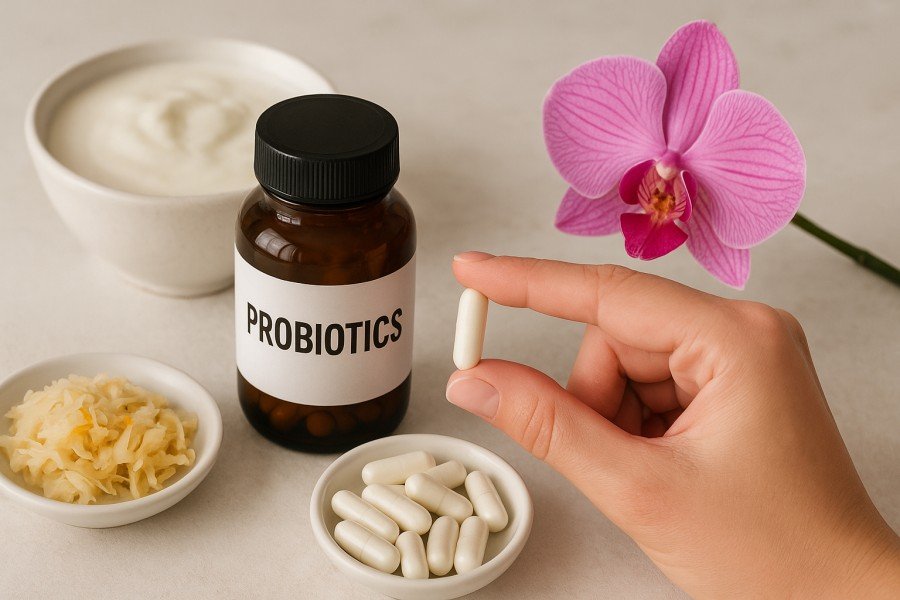In recent years, probiotics have moved from being a niche supplement to a mainstream wellness trend. Supermarket shelves are lined with capsules, powders, and even probiotic-rich foods, all promising better digestion, improved immunity, and enhanced well-being. For women, the conversation goes beyond gut health. Probiotics are now marketed as tools for maintaining vaginal balance, boosting skin health, and even supporting emotional well-being. But the critical question remains: are probiotics for female health really worth the hype?
Understanding Probiotics
Probiotics are live microorganisms, mostly beneficial bacteria and yeast, that help maintain balance in the body’s microbiome. They naturally exist in foods like yogurt, kefir, kimchi, sauerkraut, and tempeh. When taken as supplements, probiotics are designed to restore or enhance the good bacteria in the gut and other parts of the body.
The female body has its own delicate balance of bacteria, particularly in the digestive and vaginal ecosystems. Disruptions caused by antibiotics, stress, poor diet, or infections can upset this balance, leading to issues such as yeast infections, urinary tract infections (UTIs), or digestive discomfort. This is where probiotics are believed to play an important role.
Probiotics and Vaginal Health
One of the most marketed benefits of probiotics for women is their impact on vaginal health. The vagina is home to Lactobacillus bacteria, which help maintain an acidic environment that prevents harmful bacteria from thriving. Research suggests that supplementing with specific strains of Lactobacillus may help reduce the recurrence of bacterial vaginosis and yeast infections.
While probiotics are not a guaranteed cure, many women find them helpful as a preventive measure. Gynecologists often note that probiotics can be part of a broader lifestyle approach that includes good hygiene, balanced nutrition, and safe sexual practices.
Gut Health and Digestion
A healthy gut microbiome is central to overall health. For women, probiotics can ease symptoms of irritable bowel syndrome (IBS), bloating, and constipation. They may also improve nutrient absorption and strengthen the immune system.
Interestingly, studies show that gut health has a direct link to mental health through the gut-brain axis. Women dealing with mood swings, anxiety, or stress may benefit indirectly from probiotics by improving digestive balance, which in turn influences emotional well-being.

Probiotics and Women’s Skin
Hormonal fluctuations can often trigger acne, dryness, or dull skin. Emerging research suggests that probiotics may improve skin conditions by reducing inflammation and enhancing the skin barrier. Topical probiotic skincare products are also becoming popular, though oral probiotics remain the most common option for women looking for holistic benefits.
Are They Worth It?
The effectiveness of probiotics depends on several factors: the type of strain, dosage, consistency of use, and the individual’s overall health. Not all probiotics are created equal, and what works for one woman may not work for another.
Healthcare experts recommend choosing probiotics with clinically tested strains such as Lactobacillus rhamnosus GR-1 and Lactobacillus reuteri RC-14 for vaginal health or Bifidobacterium lactis for digestive support.
Cost is another consideration. Probiotic supplements can be expensive, and while many women swear by them, others may not notice a dramatic change. For those on a budget, incorporating natural probiotic-rich foods into meals can be an effective alternative.
The Bigger Picture of Women’s Wellness
Probiotics should not be seen as a magic pill. They work best as part of a balanced lifestyle that includes healthy eating, exercise, stress management, and regular check-ups. Women looking at probiotics purely as a shortcut to better health may end up disappointed.
However, for those dealing with recurring infections, digestive discomfort, or skin flare-ups, probiotics can provide meaningful support. The key lies in making informed choices and consulting with healthcare professionals before starting any supplement routine.
Connecting the Trend to Modern Lifestyles
The rise of probiotics reflects how modern wellness trends often intersect with business and consumer behavior. Just as startups to watch in the Indian market are creating innovative solutions for health-conscious buyers, probiotics have become a booming sector attracting both pharmaceutical giants and niche wellness brands.
Similarly, conversations about how long substances like medications remain in the body such as in our blog on understanding how long Percocet stays in your system highlight the growing curiosity about internal health processes. Probiotics fit into this same curiosity-driven space, where people want more control and knowledge about what happens inside their bodies.
Final Thoughts
So, are probiotics for female health worth it? The answer is both yes and no. For some women, probiotics provide clear benefits, from fewer infections to improved digestion and better skin. For others, the effects may be minimal or hard to measure.
Ultimately, probiotics are not a replacement for medical treatment or healthy living, but they can be a valuable addition to a well-rounded wellness routine. Like any health decision, the best results come from personalized choices, guided by research and professional advice.
As the probiotic industry continues to grow, the emphasis should remain on quality, transparency, and realistic expectations. Women deserve solutions that truly enhance their health, not just marketing promises.








